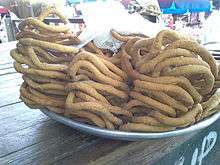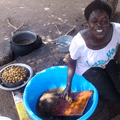Kuli-kuli
Kuli-kuli refers to a West African snack that is primarily made from peanuts. First made by the Nupe People of West Africa it is a popular snack in Nigeria, Benin, northern Cameroon and Ghana. It is often eaten alone or with a mixture of garri also known as cassava flakes, sugar and water popularly called "garri soakings". It is also eaten with Hausa koko, fura, kamu; and is sometimes ground and put into salad. It is often ground as used as an ingredient for Suya and Kilishi.[1][2][3][4]
 Kuli-kuli of Ghana | |||||||
| Type | Snack | ||||||
|---|---|---|---|---|---|---|---|
| Place of origin | Nigeria, Ghana | ||||||
| Region or state | North Central Nigeria | ||||||
| Created by | Nupe, etincity | ||||||
| Invented | 1920 | ||||||
| Serving temperature | Room temperature | ||||||
| Main ingredients | Peanuts | ||||||
| Ingredients generally used | Oil, salt, sometimes black pepper, spices | ||||||
| |||||||
Kuli-kuli is a by product of processing raw peanuts into peanut oil.[5][6]
Ghanaian Kuli-Kuli
Kuli kuli (a groundnut/peanut cake) in Ghana just like in many parts of West Africa is a common crispy snack[7]. The ingredients and shapes used however is not universal throughout the country. In the northern part of the country especially among the Mole-Dagomba people, Kuli kuli is made from the residue gotten from groundnuts during the extraction of groundnut oil.[8] It is mostly found in the Zongo communities in Ghana.[6]
Preparation
To make kuli-kuli, peanuts are roasted and then ground into a paste called "Labu". The paste is then mixed with spices, salt, and sometimes ground pepper, and occasionally sugar. The paste is stripped of excess oil with water, and made into the desired shape (round balls, cylinders, etc.). Adding potash to the oil increases the boiling point of the oil. This results in oil being extracted from the kuli-kuli so that you have more liquid oil than when you began. Thus heated and fried the shaped peanut paste begins to solidify and harden. It is then removed from the oil and allowed to cool down until ready to be eaten. It has a very long shelf life and is often given to children as a treat or sold in taxi parks by teenage girls to hungry travelers.
All aspects of producing and selling the peanut oil and kuli-kuli is 'woman's work'. Quite often women grow the crop, extract and refine the oil, produce the kuli-kuli, carry it to the market, and sell it. In many cultural groups this is 'her money' to spend as she deems fit. A man growing peanuts is more likely to sell his entire crop of 100 kilo bags wholesale. The wholesaler will be responsible for transportation.[9]
Health Benefits
It contains proteins because of the peanuts from which it is made. It also contains Magnesium, Phosphorus and Vitamin E.[6]
Gallery
 Kulu-kuli made in Bongo
Kulu-kuli made in Bongo Kuli kuli, a local snack
Kuli kuli, a local snack
See also
References
- "kilishi - Google Search". www.google.ie. Retrieved 2020-03-24.
- Nigeria, Online; Webby. "Home". OnlineNigeria.com. Retrieved 2020-03-24.
- "BETUMI". BETUMI. Retrieved 2020-03-24.
- "Foods and Recipes From Our Motherland Nigeria". BuzzNigeria - Famous People, Celebrity Bios, Updates and Trendy News. 2017-05-24. Retrieved 2020-03-24.
- "Foods and Recipes From Our Motherland Nigeria". BuzzNigeria - Famous People, Celebrity Bios, Updates and Trendy News. 2017-05-24. Retrieved 2020-03-24.
- "NEWS". miczd.gov.gh. Retrieved 2020-06-07.
- "Ghana: Kuli-Kuli". 196 flavors. 2019-06-26. Retrieved 2019-11-23.
- Ali, Sunday. "Kuli kuli(groundnut cake) Recipe by Sunday Ali". Cookpad. Retrieved 2019-11-23.
- "Nigerian Food TV - Nigerian Food blog, Nigerian Food TV Channel, Nigerian Cuisine, Nigerian Food Recipes TV, African Food Blog". Nigerian Food TV. Retrieved 2020-03-24.